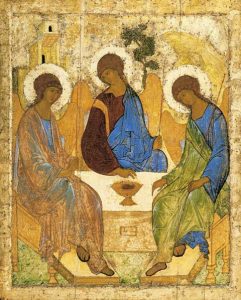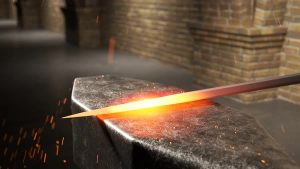Question from my In Box: Who saved Daniel and the three youths in the furnace? Is the Angel of the Lord another name for the Archangel Gabriel?
The person whom Bible writers call “the Angel of the LORD” is often considered a “christophany” – an appearance of Christ who was not yet incarnate.
In Exodus 3,
The Angel of YHWH1 appeared to [Moses] in a flame of fire from the midst of a bush… He said, “I am the God of your father—the God of Abraham, the God of Isaac, and the God of Jacob…” And YHWH said: “I have surely seen the oppression of My people who are in Egypt…” Then Moses said to God, “Indeed, when I come to the children of Israel and say to them, ‘The God of your fathers has sent me to you,’ and they say to me, ‘What is His name?’ what shall I say to them?” And God said to Moses, “I AM WHO I AM” (v.2,7,13-14)
The Angel of YHWH speaks on behalf of YHWH, but also at times when he speaks the writer simply says “YHWH said.” (See Judges 6:11-27).
In Genesis 16, the Angel of YHWH speaks to Hagar, promising that he himself will bless her sons (v.10), so:
So she named YHWH who spoke to her: “You are El-roi” [the God who sees me], for she said, “Have I also here seen Him who sees me?” Therefore the well was called Therefore the well was called Beer Lahai Roi. [Well of the Living One Who Sees Me.]” (v.13-14).
As far as Hagar (and Moses the writer) are concerned, talking to the Angel of YHWH is talking to YHWH.

Then YHWH appeared to him… So he lifted his eyes and looked, and behold, three men were standing by him (18:1-2),
In the book of Daniel, when the Angel has come down into the furnace with the three young men, we read:
And the king said, “Look, I see four unbound men walking about in the fire, and no harm has come to them, and the appearance of the fourth is like a son of a god!2”(Daniel 3:92)
And so, in the canon to the Theotokos in Tone 4, at the irmos of Ode 8 we sing:
He who was born of the Theotokos saved the holy youths in the furnace: He who was then prefigured, has now been born on earth, and he gathers all creation to sing: All you works of the lord, bless the lord, and exalt him above all forever.
And again in the Canon of Preparation for Holy Communion, in the irmos to Ode 8:
God came down upon the Hebrew youths in the fiery furnace and changed the flames into dew. Praise the works of the Lord, and exalt Him throughout all ages
In fact, the furnace is an image of the womb of the Theotokos. At Matins for Christmas, we sing:
Babylon’s bedewing furnace bore the image of an extraordinary wonder. For it did not burn the youths it accepted, nor did the fire of Divinity consume the Virgin’s womb wherein it went. So let us melodiously sing in praise: Let all creation bless and extol the Lord, and let it exalt Him supremely to the ages.
We recall that scripture reveals God as being like a consuming fire (Deut. 4:34, 9:3; Heb. 12:29). That image is especially striking in the account of Uzzah's touching the Ark of the Covenant, which – like the Theotokos – contained the presence of God.
“And the anger of the Lord was kindled against Uzzah; and God smote him there because he put forth his hand to the ark; and he died there beside the ark of God.” (2 Samuel 6:7)
The first Christians marveled when they realized that the Virgin contained God the Consuming Fire within herself without being consumed.
The furnace moist with dew was the image and figure of a wonder past nature. For it did not burn the children whom it had received, even as the fire of the Godhead did not consume the Virgin’s womb into which it had descended. Therefore in praise let us sing: Let the whole creation bless the Lord and exalt him above all for ever. (Irmos, Ode 8 of the Canon of the Nativity)
And they found this wonder prefigured in the appearance of the Angel to Moses in the burning bush.
“And the angel of YHWH appeared to him in a flame of fire out of the midst of a bush; and he looked, and lo, the bush was burning, yet it was not consumed.” (Exodus 3:2)
And this miraculous preservation in the midst of fire applies to us as well. In the sobering Pre-Communion Prayer of Saint Symeon the New Theologian, we pray,
These things make me bold, my Christ, these things give me wings, and I take courage from the wealth of thy goodness to us. And rejoicing and trembling at once, I who am straw partake of fire. And, strange wonder, I am ineffably bedewed, like the bush of old which burned without being consumed.
 Saint Maximus, in Opuscula 16 and again in Ambiguum 7, describes how a steel sword, being forged in fire, does not cease to be iron, but it begins to participate in the properties of the fire so that it likewise emits light and heat. In the same way, by uniting human and divine natures in his one Person, Christ makes his humanity divine. And we who are in him [may] likewise become partakers of his divine life and nature (2 Peter 1:7; John 15:1-9). We do not become God by nature, but we become what Christ is through the action of grace.
Saint Maximus, in Opuscula 16 and again in Ambiguum 7, describes how a steel sword, being forged in fire, does not cease to be iron, but it begins to participate in the properties of the fire so that it likewise emits light and heat. In the same way, by uniting human and divine natures in his one Person, Christ makes his humanity divine. And we who are in him [may] likewise become partakers of his divine life and nature (2 Peter 1:7; John 15:1-9). We do not become God by nature, but we become what Christ is through the action of grace.
The God who came down into the furnace made it a place of light and of refreshing for the three youths, but a place of fiery destruction for the guards who approached. Our encounter with God, in the Last Judgment and here and now in the Eucharist, will be either for our transformation into the likeness of his light and holiness, or for our condemnation and destruction; the difference depends on what we are becoming.
Notes
1. The Hebrew word spelled YHWH comes from “I am who I am.” Jews at the time of Christ pronounced this Name with their word for “Lord,” so in English Bibles it is usually written “LORD” in capital letters. Our Greek Bible uses the word Kyrios or “Lord” throughout, both for YHWH and for “Lord.” But here I will highlight when the Hebrew original points out the Name YHWH, because it makes clearer the self-revelation of the Angel of YHWH.
2. The Church here reads the text of Theodotion which reads ὁμοία υἱῷ θεοῦ “like a son of a god”, while the Old Greek text reads ὁμοίωμα ἀγγέλου θεοῦ “likeness of a messenger/angel of god.”






